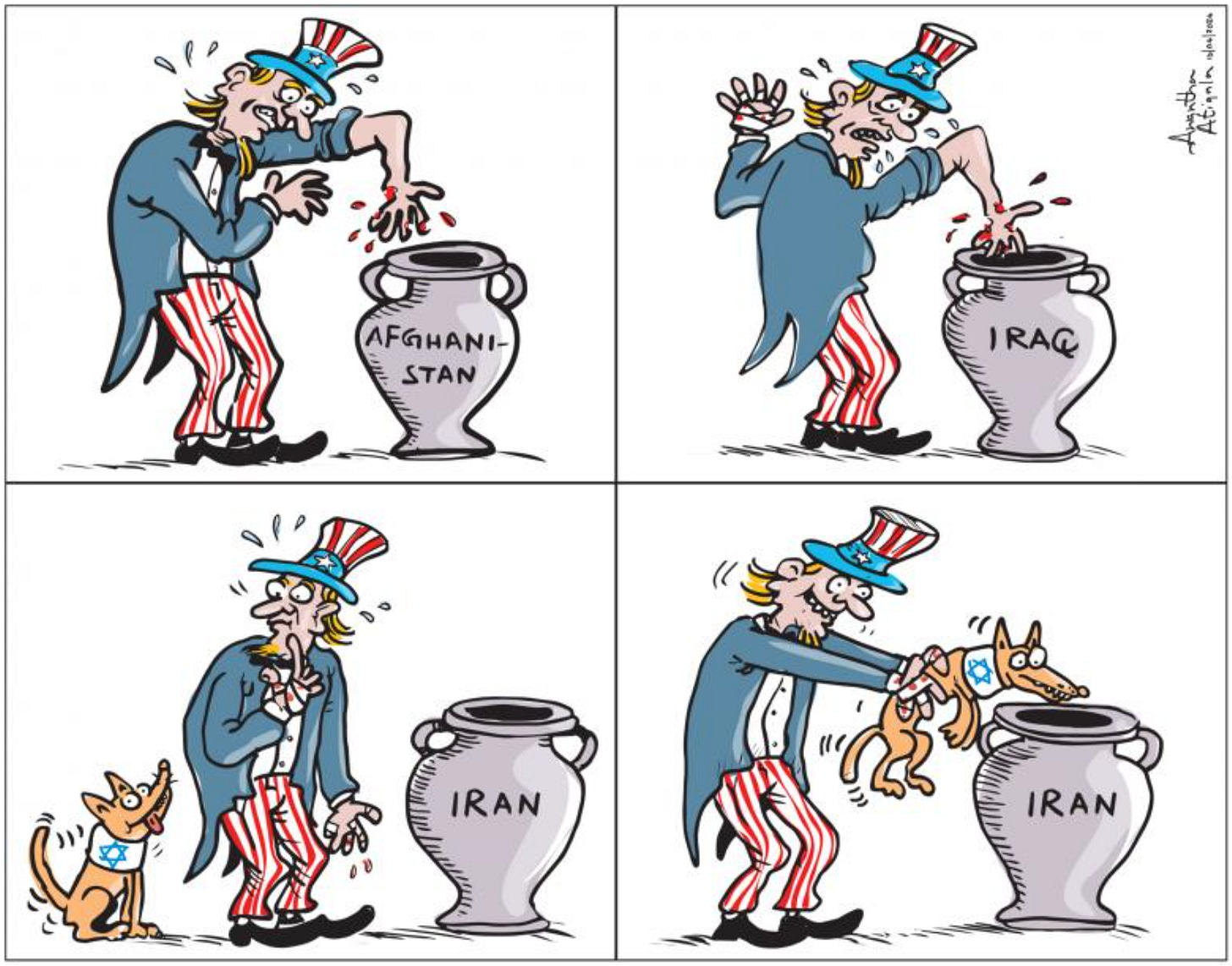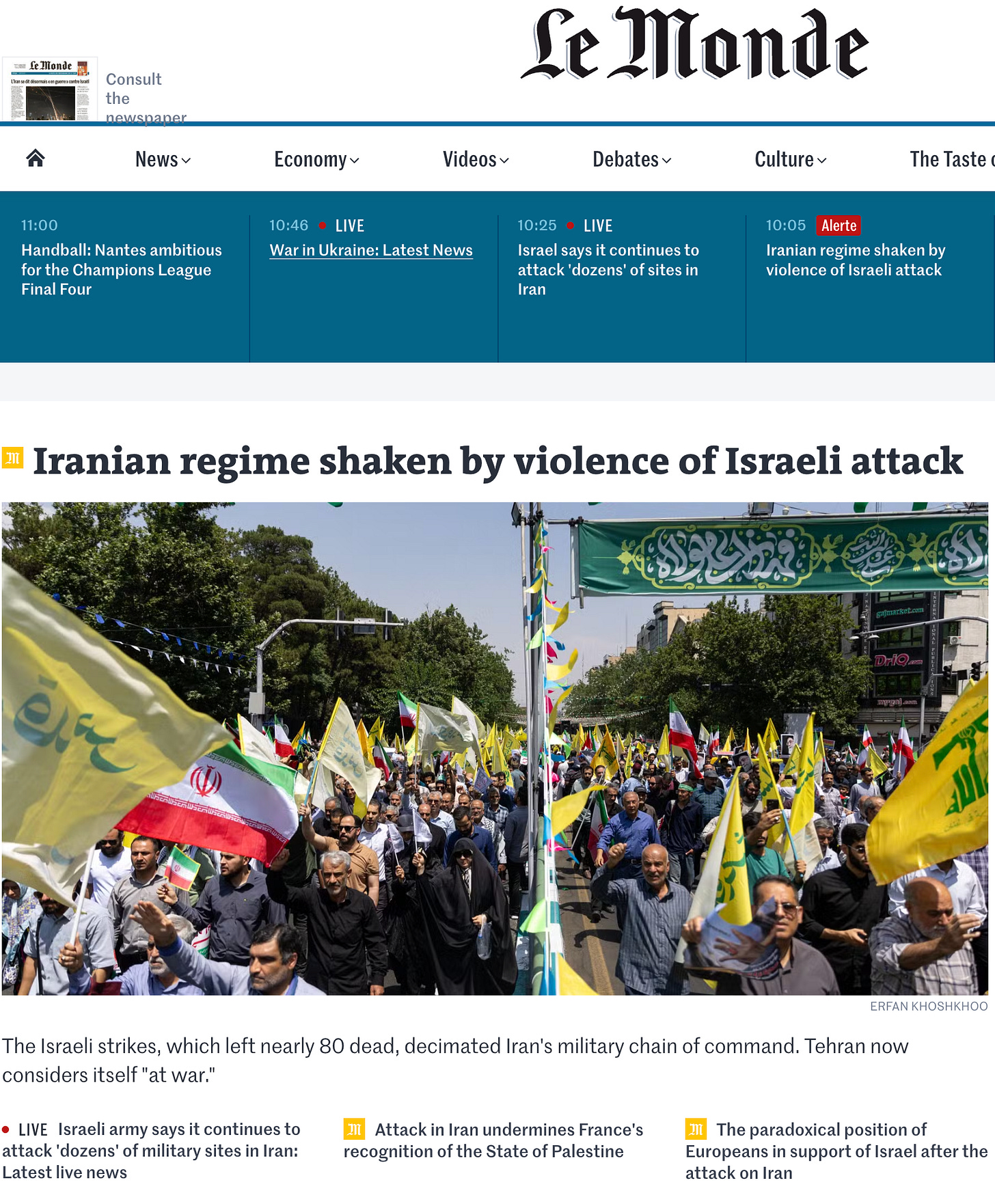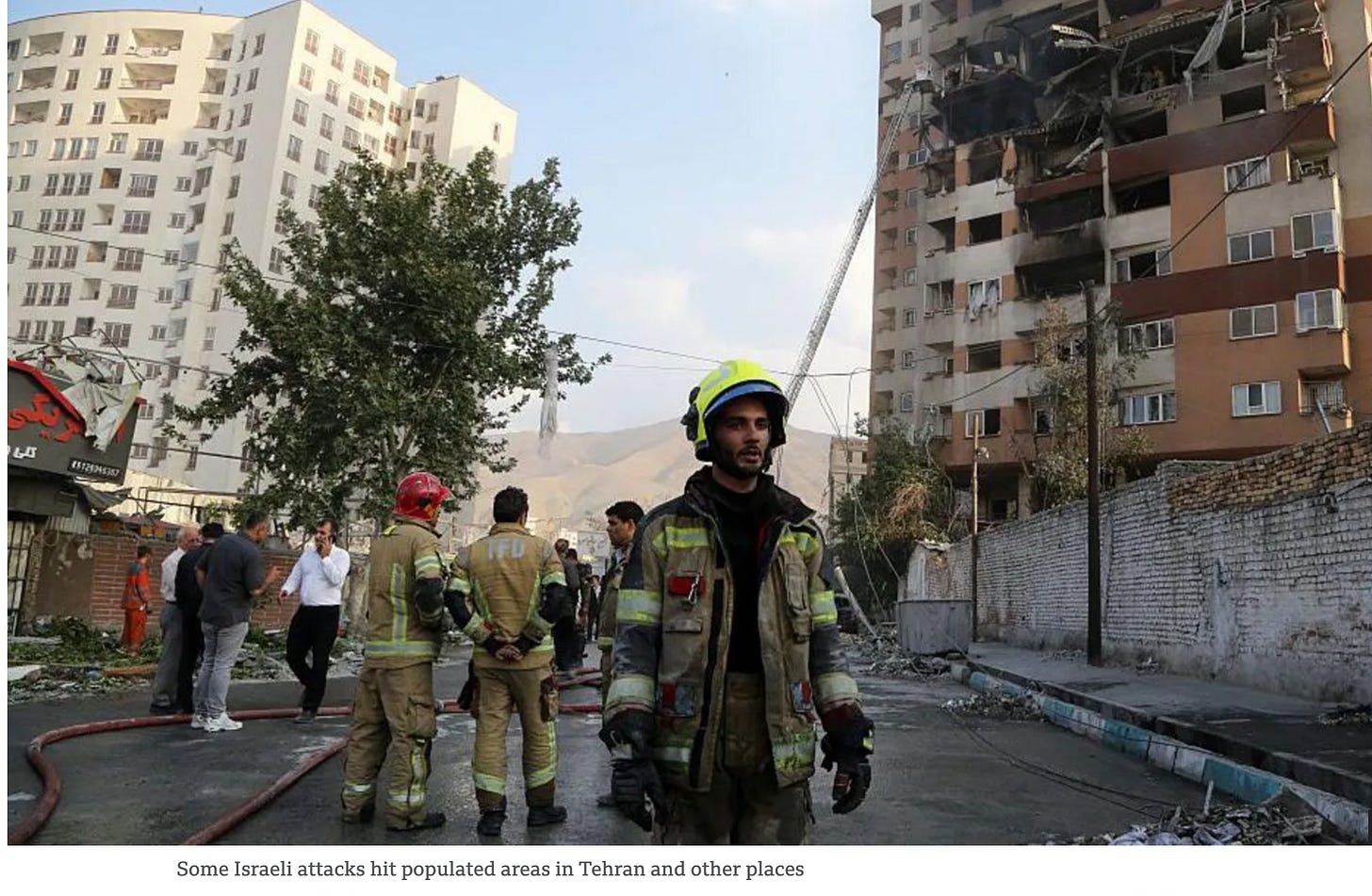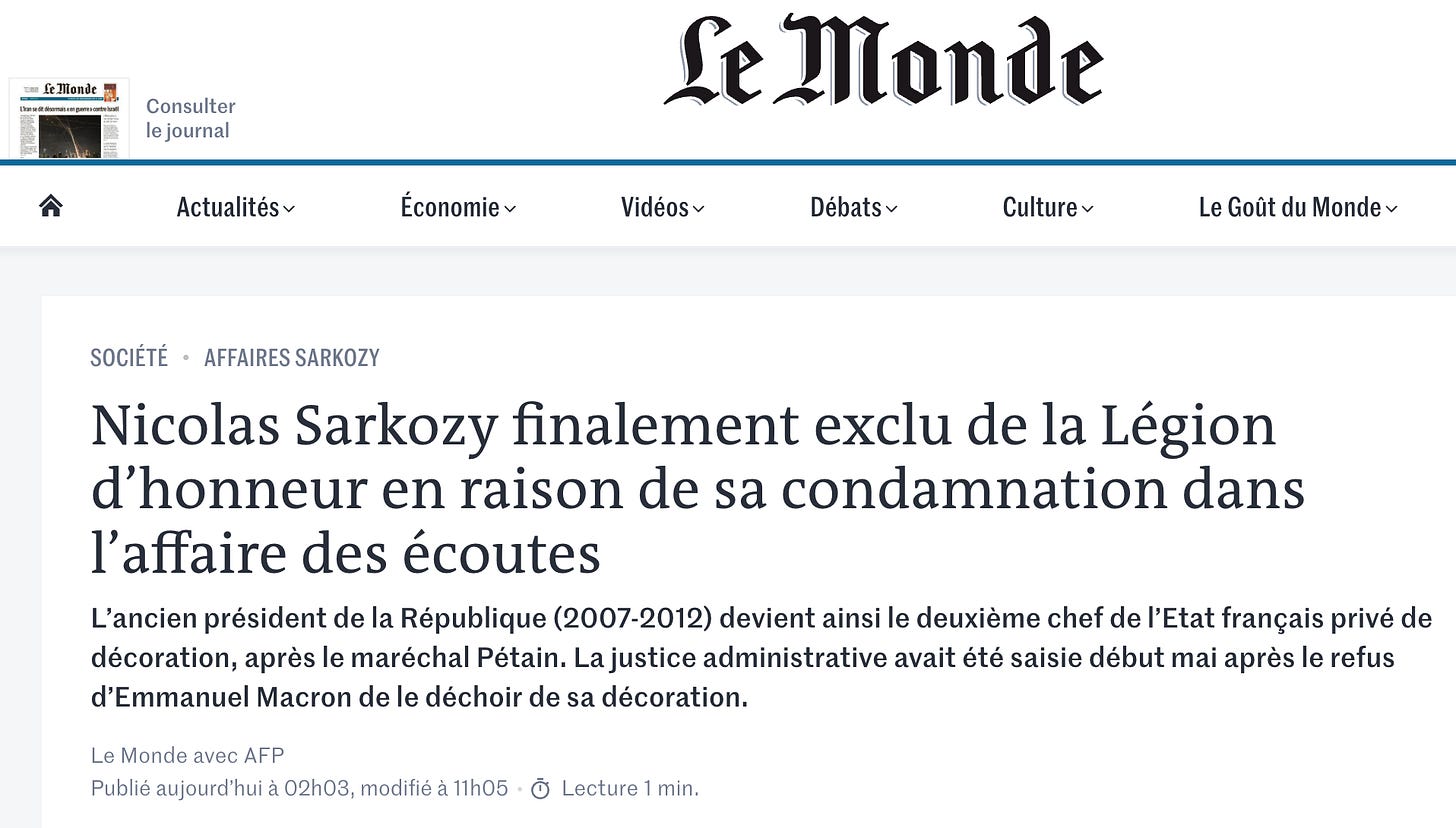TWTW: The World This Week #147
Who's in control anywhere? Iran-Israel, Ukraine-Russia, Donald Trump en marche... Iran and Ukraine fight back... On deck: the G7 ...For our paid: endangered penguins and bears plus our global cartoons
In this weekly feature for Andelman Unleashed, we continue to explore how the media of other nations are reporting and commenting on the United States, and how they are viewing the rest of the world.
To emphasize, we cover lots of ground—diving each week through 30+ newspapers & 100+ websites on every continent to distill the world. So, you may not want to read it all, but it's all here for you!
Coming to you this week again from Paris….
How others see America
This week’s events demonstrate quite vividly how little in control any more of anything is Donald Trump or the America he is seen increasingly as having taken hostage. Beyond America’s shores, the United States, but especially its ruler, is no longer a power that can hold very much sway at all over the profound events and especially the violence that Trump pledged to end on his first day in office—and that his supporters once took as gospel.
How does the world survive Donald Trump … and how does America? Increasingly, it’s beginning to seem the answer may be be like amputating a diseased or profoundly wounded limb. The central fear today to a large degree appears to be the spread of unconstrained power and its contagion. Instead of once-promised negotiations, today it is violence and mayhem….too often by proxy. Instead of America getting its hands dirty in the interest of nurturing democracy or preventing catastrophe, it is to surrogates Trump turns as he rotates his nation inward—little able to influence even the most catastrophic events. Which Sri Lankan cartoonist Awantha Arigala has captured to perfection:
Trump appears to the world still to be living his own little dream, as Mallika Soni wrote for India’s leading broadcast news site News18:
US President Donald Trump said that Iran hardliners who refused to negotiate are now “dead" as he warned that the situation will only worsen if Tehran fails to act swiftly amid a fresh wave of conflict between Israel and Iran.
Donald Trump said he had “given Iran chance after chance" to make a deal and warned the Iranian leadership that the US and Israel possess the most lethal military technology in the world.
“They are all DEAD now, and it will only get worse!" the US President said, referencing the deaths of key Iranian commanders, including the Revolutionary Guard chief Hossein Salami, killed in Israeli strikes overnight, adding, “Iran must make a deal, before there is nothing left, and save what was once known as the Iranian Empire. No more death, no more destruction—JUST DO IT, BEFORE IT IS TOO LATE."
To which Iran’s Supreme Leader immediately turned an utterly deaf ear, as did Trump ally Benjamin Netanyahu.
But leave it to The Economist to capture this to prefection:
Since Mr Trump began taking control of the Republican Party more than a decade ago, it has often been noted that he was succeeding in “normalising” behaviour that would have once scandalised members of both parties….
What Mr Trump succeeds in doing is trivialising obnoxious and even corrosive conduct….
As it happens, two House Republicans introduced a bill last month to get to the bottom of this phenomenon. The bill instructs the National Institutes of Health to spend precious federal dollars to “conduct or support research to advance the understanding of Trump Derangement Syndrome, including its origins, manifestations, and long-term effects”. What more perfect demonstration could there be of the syndrome itself?
Meanwhile, The Telegraph in London put a whole lot of this week’s events in perspective….calling attention to just how little clout Trump has left:
Donald Trump has told Iran to make a deal over its nuclear programme or there will be “nothing left” of the country. The US president warned there would be “slaughter” if the regime refused to return to the table.
“There has already been great death and destruction, but there is still time to make this slaughter, with the next already planned attacks being even more brutal, come to an end,” he wrote on his Truth Social platform.
Israel claimed to have hit 100 targets using 200 warplanes overnight, striking Iran’s nuclear facilities, wiping out dozens of its air defence systems and assassinating military commanders. Mr Trump, who had prior knowledge of ‘Operation Rising Lion’, blamed the attacks on Iran stalling negotiations aimed at preventing the weaponisation of its nuclear programme.
“I gave Iran chance after chance to make a deal...they just couldn’t get it done,” he said.
Reeling from the attack, Tehran has pulled out of the next round of talks with the US scheduled for Sunday.
Trump’s threats could backfire
Trump’s threat to Iran to agree on a deal over its nuclear programme is likely to backfire. Such an approach does not draw Tehran to the negotiating table; it in fact does quite the opposite by pushing the latter away.
To assume that pressuring Iran will lead to a favourable outcome suggests the Trump’s administration is wildly miscalculating, misreading and misunderstanding the Islamic Republic.
As expected, Iranian state media reports have already said that Iran will not participate in talks that were due this Sunday with the US in Oman. A senior nuclear official has also made clear that Iran will continue its nuclear activities, and that this latest attack has “not affected our determination.”
All this may even push Iran to follow through on previous threats to withdraw from the Nuclear Non-Proliferation Treaty. If Iran were to do so, that would mean losing access through the crucial, but already limited window of visibility through the UN’s nuclear watchdog.
Trump’s tough words could [also] push Iran to get creative in its response. Though much of Iran’s key military expertise and physical capabilities, along with many of its proxy militant groups, have been decimated by this and earlier Israeli attacks, Tehran could leverage cyberattacks with the support of China, Russia and North Korea. The Iran-backed Houthis in Yemen could also be convinced to break their ceasefire with the US and begin launching attacks into the Red Sea—operations that severely disrupted global trade routes.
So it was hardly surprising that British Prime Minister Keir Starmer quickly washed his hands of the entire affair, as London’s The Guardian reported:
Britain was not involved in providing military support to Israel’s attack on Iran, the UK government has said….The response comes amid a hardening of the British line against Israel, with ministers having condemned its aid blockade of Gaza and placed sanctions on two members of the Israeli government. British ministers and officials met to decide their response. People briefed on those meetings said the UK had decided not to help shoot down the drones or intervene militarily.
And in London, The Sunday Times reported:
Meanwhile, French president Emmanuel Macron was himself leaning toward Israel, as the leading French business daily Les Echos reported:
"France reaffirms Israel's right to protect itself and ensure its security," Emmanuel Macron declared after the Israeli strikes in Iran, recalling that he had "repeatedly condemned" Iran's nuclear program.
"In order not to jeopardize the stability of the entire region, I call on the parties to exercise the utmost restraint and de-escalate," he added on the X network, adding that he had spoken with US President Donald Trump as well as the Crown Prince of Saudi Arabia, the King of Jordan, the President of the United Arab Emirate
Still, there were some quick online responses to Macron, like this from Shafee Saeed:
Mr. President, it’s not Iran that attacked Israel, it’s Israel that attacked my country. Why wasn’t there the least condemnation of that? The right of self-defense is also well known by Iran, or is this a right exclusively reserved for Israel.
Special for the Paid !
Andelman Unleashed has unleashed new, (lightly) paid tiers.
For new paid subscribers, an inscribed copy of my latest book, A Red Line in the Sand. Along with a weekly portfolio of cartoons, largely from Cartooning for Peace … and Friday a weekly live conversation with Andelman. Back next Friday, June 20, with a very special guest:
live from Cambridge
Founding director of the Program on Intrastate Conflict, Conflict Prevention, and Conflict Resolution at Harvard's John F. Kennedy School of Government President-emeritus of the World Peace Foundation, his mission is the establishment of an International Court of Corruption.
To PREPARE, you may wish to read his two of his books: When States Fail: Causes and Consequences and The Corruption Cure: How Citizens and Leaders Can Combat Graft
How others see the World
And what next? All-out war, perhaps?
That’s certainly how Le Monde sees it:
On Sunday, Le Monde’s Washington correspondent Piotr Smolar observed:
Trump is torn between helping Israel and rejecting foreign wars.
Not to mention the paper’s extended interview with Kamala Harris’s national security advisor Philip Gordon with the headline:
In attacking Iran, Netanyahu has backed Trump into a corner
And then there was Le Figaro :
Israel hits Iran to the heart
Air raids have destroyed nuclear installations and eliminated the top military and scientific leaders. Friday, Iran fought back.
An operation clearly and minutely planned
Under shock, Teheran blames Washington
The long battle in the West against the Iranian nuclear [bomb]
But it’s the front page Le Figaro editorial that really stings:
Despite its military achievement, the IDF is not immune to causing the opposite of the desired strategic effect.
For decades , Benjamin Netanyahu has expressed the temptation to eliminate Iran's "existential threat" by force, but has hesitated given the enormous risks involved in taking action….
Despite its military achievement, Israel is not immune to the possibility of having the opposite of its intended strategic effect. Its attack could finally convince the mullahs that their survival depends on nuclear weapons, for which they lack neither the raw materials nor the know-how. Iranian retaliation against American targets could draw the United States into a regional conflict. And Trump could make Netanyahu pay for the escalation he wanted to avoid.
Indeed, across the Channel, the BBC’s Persian editor Amir Azimi has quite a clear-eyed view of just what could be in store:
Israel's endgame may be regime change in Iran - but it's a gamble
Many Iranians are unhappy with the state of the economy, the lack of freedom of speech, women's rights, and minority rights. Israel's attack is posing a real threat to Iran's leadership.
The strikes have killed the commander of the Iranian Revolutionary Guard Corps (IRGC), the chief of staff of the armed forces, and many other high-ranking IRGC chiefs, and the Israeli attack is not yet over. Iran retaliated in the afternoon, with the Revolutionary Guard saying it carried out attacks against "dozens of targets, military centres and airbases".
The situation escalated quickly and after Iran's retaliatory missile attacks, Netanyahu said, "More is on the way". More of Iran's leaders could be targeted. Israel may calculate that the attacks and killings could unsettle the regime and open the way for a popular uprising. At least this is what Netanyahu hopes for.
But this is a gamble—a big one. There’s no evidence such a chain reaction will start in the first place, but even if it starts, it is unclear where such a process might lead.
Those with the most power in Iran are the people who control the armed forces and the economy, and most of that is in the hands of hardliners in the IRGC and some other unelected bodies. They don't need to stage a coup because they are already in power, and they could take Iran in a more confrontational direction.
And then comes the warning from Israel’s defense minister. As Yaniv Kubovich reported for Haaretz:
Defense Minister Israel Katz said he concluded a security briefing with the defense officials by noting that further attacks by Iran would lead to the capital's destruction.
"The Iranian dictator is turning the citizens of Iran into captives and bringing about a reality in which they – especially the residents of Tehran – will pay a heavy price for the criminal assault on Israeli civilians," he said. "If [Supreme Leader Ayatollah] Khamenei continues to fire missiles at Israel's home front – Tehran will burn."
Indeed, it’s worth asking, can total (or at least endless) war be far behind? As London’s Financial Times reported:
Then, who exactly gets sucked into this quagmire? As the FT continued:
On his Truth Social platform, US President Donald Trump warned Tehran that the next “already planned attacks” on it would be “even more brutal”, adding that “Iran must make a deal [on its nuclear programme], before there is nothing left”.
For more than two decades, Israel has viewed Iran’s nuclear activities as an existential threat and has long been opposed to efforts by the US and other powers to negotiate with Tehran, which insists its programme is purely peaceful. US administrations going back to George W Bush have sought to prevent an Israeli strike on the Islamic republic for fear of escalation into a wider conflict, but Trump has signalled fewer misgivings. Speaking to ABC News, he said of the Israeli attack: “I think it’s been excellent.”
Is this how to get sucked into a war that you’d pledged would never happen during a Trump presidency?
As David C. Unger, longtime chief foreign affairs editorial writer for The New York Times, told our weekly Unleashed Conversation gaggle on Friday, Trump and America may simply looking at entirely the wrong form of warfare…
The full recording is below the fold for our most valued, lightly paid subscribers!
Remember Ukraine? Object lesson for autocrats….
After all, isn’t regime change exactly what Putin wanted in Kyiv? Just see how well that’s working out, as Kateryna Zakharchenko reported in the Kyiv Post….
Drone Strike Hits Russia’s Largest Chemical Plant in Overnight Attack
Drones struck deep inside Russia overnight, targeting major chemical sites including Nevinnomysskiy Azot, a strategic fertilizer giant in the heart of southern industry.
Russian authorities reported a drone attack targeting multiple sites. One of the main targets was reportedly “Nevinnomysskiy Azot,” the largest chemical plant in the Stavropol region and a key industrial hub for southern Russia. The General Staff of the Armed Forces of Ukraine confirmed that Ukrainian drones carried out strikes overnight on Russian military-industrial facilities.
The Nevinnomysskiy Azot chemical plant is located over 1,000 kilometers (about 620 miles) from the Ukrainian border and is one of the key producers of components for explosives, ammunition, and rocket fuel.
Additionally, another chemical facility in Russia’s Samara region was damaged that night. “There was an attempted UAV attack on one of Novokuybyshevsk’s industrial enterprises,” said regional governor Vyacheslav Fedorishchev.
Meanwhile, collateral damage ….Russians in Iran
The Ukrainian news site Gordon delighted in reporting with a bit of its own embellishment about some who were left behind (tho perhaps not forgotten?):
Russian artist Fedor Bondarchuk, Russian Minister of Culture Olga Lyubimova—a top official from the entourage of the illegitimate president of the aggressor country, Vladimir Putin—and 60 other artists from the Tchaikovsky Symphony Orchestra of Russia, including conductor Arseny Tkachenko, who were touring in Tehran on the occasion of the so-called Day of Russian Culture, ended up in Iran.
Dancers from the Lezginka ensemble are also there. All of them cannot leave Iran. The Russian Ministry of Culture stated that there is supposedly no threat to their lives and health.
And then there’s NATO
The inimitable Brussels-based authors of Substack’s La Mattinale Européenne, Christian Spillmann and David Carretta, even before the Israeli attack on Iran, were worried:
Trump has plunged NATO into an existential crisis
Donald Trump has broken the transatlantic bond. The North Atlantic Treaty Organization has entered utilitarian mode out of self-interest, to give Europe time to rebuild its defenses. But the spirit of NATO is dead. Can we still use the term alliance when one partner interferes in the political life of its allies through blackmail, when another speaks of a "fracture" between pro-peace and pro-war parties? Can NATO still exist when the United States wants to annex Canada or invade Greenland, a Danish territory? The summit in The Hague on June 24 and 25 will be a shadow theater, a game of masks, of things left unsaid to hide an inconvenient situation. But there is something rotten within the Atlantic Alliance.
Now for the piece de résistance….G7
Let’s all gather in Alberta (Canada) for the G7 summit of world leaders and their guests….Starting Sunday, indeed with little chance for any real agreement, here’s what Euronews suggested we can anticipate:
Israel's attack on Iran has added a new wrinkle to the global picture as G7 leaders gather in Kananaskis [Alberta] for a summit beginning Monday.
Ahead of the G7 summit, there are already signs of subtle pushback against Trump from fellow leaders in the group. French President Emanuel Macron is visiting Greenland this weekend in a show of European solidarity.
Carney has said the US is no longer the “predominant” force in the world after Trump's tariffs created fissures in a decades-long partnership between the US and its northern neighbour. “We stood shoulder to shoulder with the Americans throughout the Cold War and in the decades that followed, as the United States played a predominant role on the world stage," Carney said. "Today, that predominance is a thing of the past.”
The new prime minister added that with the fall of the Berlin Wall in 1989, the US became the global hegemon, a position of authority undermined by Trump's transactional nature that puts little emphasis on defending democratic values or the rule of law. “Now the United States is beginning to monetize its hegemony: charging for access to its markets and reducing its relative contributions to our collective security,” Carney said.
Israel's attacks on Iran has added a new wrinkle to the global picture and will likely dominate discussions during the summit. Other topics will likely include Trump's looming tariffs and the war in Ukraine.
But even as other G7 leaders defuse any public disputes with Trump, the US president's vision for the world remains largely incompatible with what they want.
Finally, The Légion d’Honneur loses one member
As one who is himself privileged to hold the rank of chevalier in the Légion d’Honneur, France’s highest civilian decoration, it was with considerable emotion that Andelman viewed this headline:
Nicolas Sarkozy has been removed from the Legion of Honour following his final conviction to one year in prison for corruption in the wiretapping affair, according to a decree published Sunday, June 15, in the Official Journal. The former President of the Republic (2007-2012) has also been stripped of the National Order of Merit.
Nicolas Sarkozy thus becomes the second French head of state to be deprived of the Legion of Honour, after Marshal Pétain, from whom it was withdrawn after his conviction in August 1945 for high treason and intelligence with the enemy.
[That would be with Hitler’s Nazis whose ‘Vichy’ puppet occupation regime in France Pétain ran brutally throughout the Second World War]. But clearly the current president felt that vengeance can cut both ways:
Emmanuel Macron, Grand Master of the Order of the Legion of Honor, had refused to demote his predecessor. "I think it's very important that former presidents are respected ," the head of state said on April 24.
The administrative court had been seized in early May by half a dozen applicants, all children or grandchildren of decorated officials. "Withdrawing the Legion of Honour and the National Order of Merit from former President Nicolas Sarkozy is not a lack of respect for the office of president, it is a way of protecting it ," they wrote.
[The wiretaps involved, as The Guardian reported]:
Sarkozy had been in contact with a magistrate, Gilbert Azibert, then a member of the Cour de Cassation, to ask for confidential information about an investigation into campaign donations from the L’Oréal heiress Liliane Bettencourt. In those conversations, it is alleged that Sarkozy promised Azibert promotion to a high-level position in Monaco in return for information on the case against him.
What’s new on ‘paid’
Now, for our most highly valued, but lightly paid, members .... From Arctic penguins to Romanian bears, species under attack….the full video of our Friday zooomversation with New York Times veteran David C. Unger and Le Monde’s Patrice de Beer… winding up with a bonus gallery from cartoonists around the world riffing on Trump, Musk, Ukraine, and tutti quanti, courtesy of Cartooning for Peace and Le Monde….
—Editing by Pamela Title
Keep reading with a 7-day free trial
Subscribe to Andelman Unleashed to keep reading this post and get 7 days of free access to the full post archives.
















